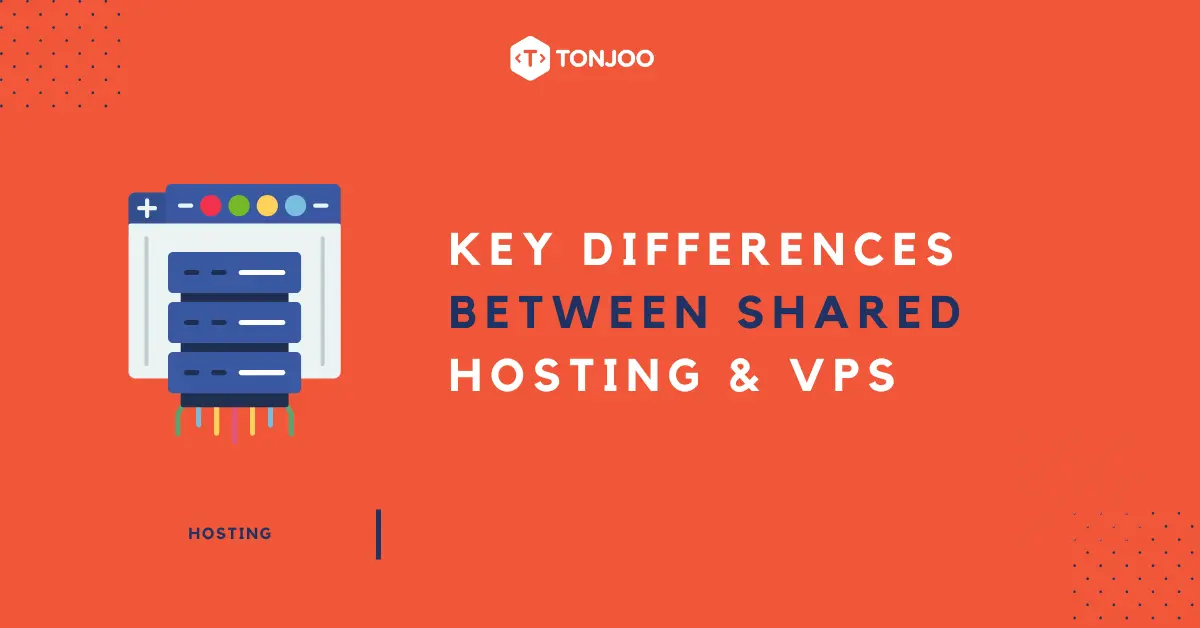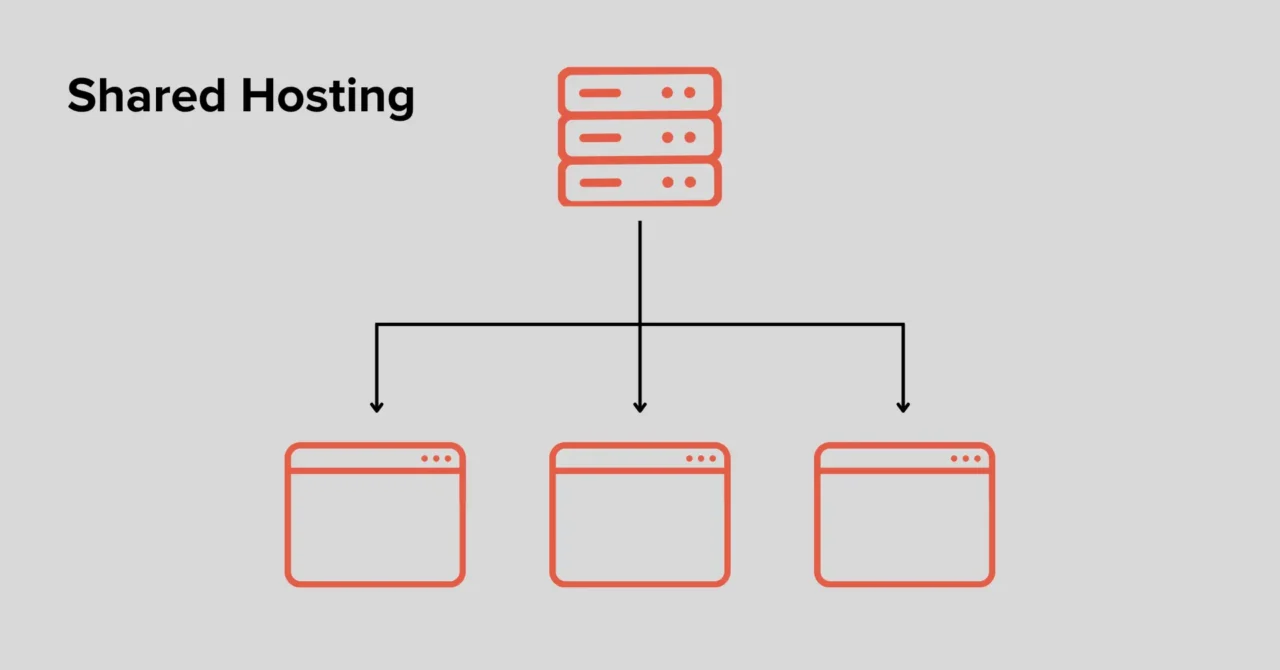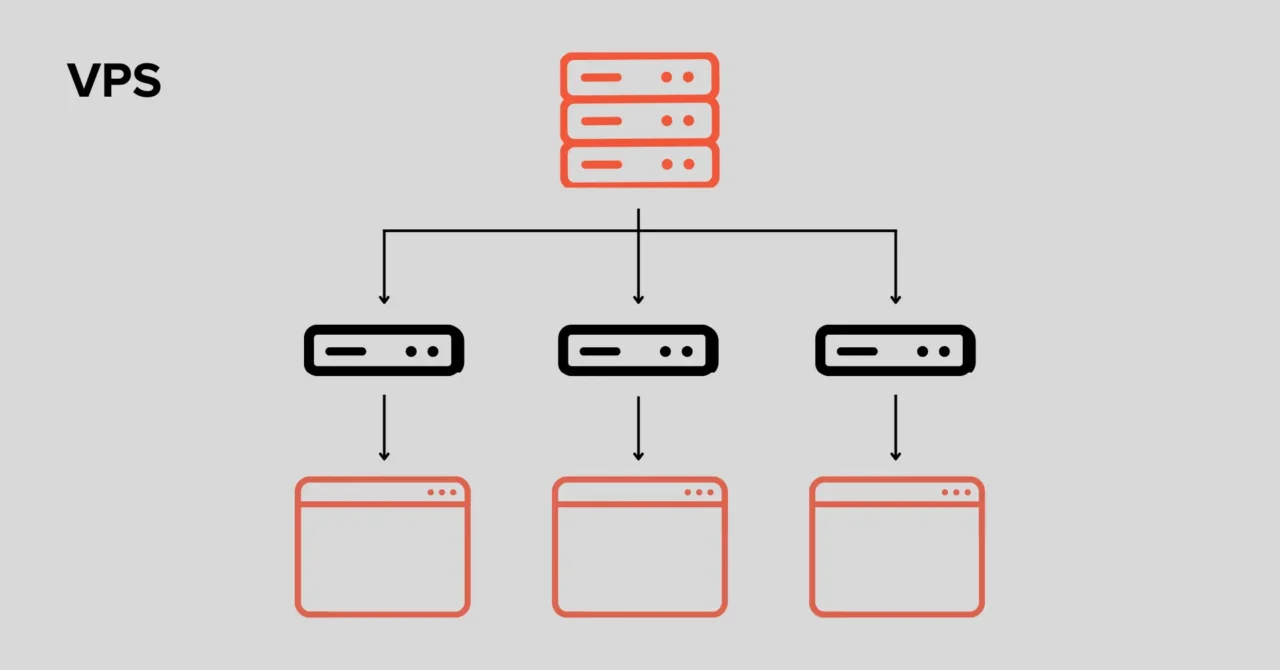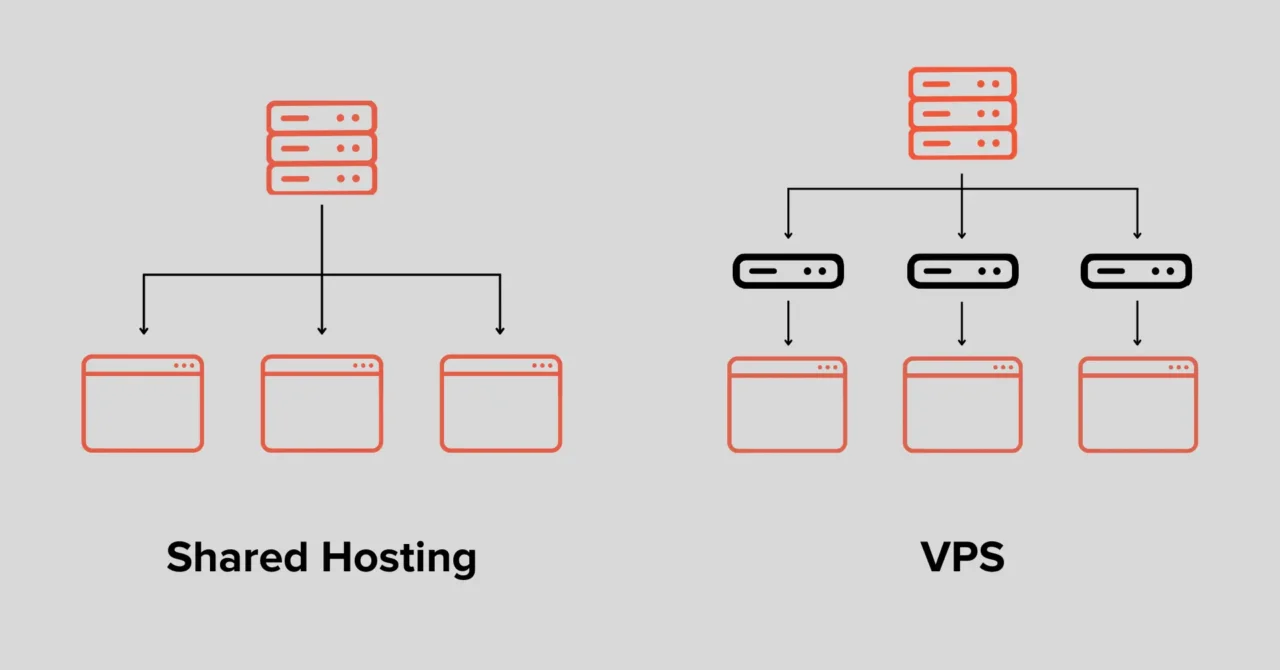
Shared hosting and VPS are two of the most popular and widely used web hosting services on the market. But which one is truly better? Before you decide, let’s dive into this article exploring the key differences between shared hosting and VPS.
In this post, Tonjoo will break down what shared hosting and VPS are, highlight their differences, and present a head-to-head comparison. We will focus on the fundamental concepts, features, and the pros and cons of each service.
Stick around as we begin our discussion with shared hosting.
Table of Contents
What is Shared Hosting?

Shared hosting is a web hosting service where multiple hosting accounts reside on a single server. In short, it’s a shared hosting service used by many people at once.
An easy analogy for shared hosting is renting a room in a house that will be occupied by four people. Each tenant has their own private space, like a bedroom. However, other areas such as the kitchen, bathroom, and living room are used collectively and in turns. These shared spaces are the “resources” in shared hosting.
The shared facilities in this model include memory, disk space, and CPU. In addition to these shared resources, the bandwidth capacity in shared hosting is also limited.
Consequently, the cost of shared hosting is typically much lower. It’s an ideal choice for beginners whose websites are still small in scope.
Pros & Cons of Shared Hosting
Based on the definition and characteristics explained above, we can summarize the advantages and disadvantages of shared hosting as follows:
1. Advantages of Shared Hosting
- Perfect for beginners with small-scale websites.
- More economical and affordable compared to other web hosting types.
- Easy to use and manage.
- The setup is simple and straightforward.
- No technical knowledge is required.
- Overall server management is handled by the hosting provider.
2. Disadvantages of Shared Hosting
- No dedicated resources are available.
- Storage space and bandwidth capacity are very limited.
- Access to the backend is extremely restricted.
- Users do not have root access.
- Slower access speeds because multiple websites use the same server.
- Potential to be affected by server issues or overloads caused by other websites.
- High traffic can lead to various problems, including frequent errors.
Given these pros and cons, shared hosting is best suited for beginners—whether you’re on a tight budget or an average user without knowledge of coding and web development.
This type of hosting is also ideal for static websites or personal blogs with low traffic. While it can be used for small to medium-sized business websites, you will need to upgrade to a VPS as soon as your site starts receiving high traffic.
What is a VPS?

A Virtual Private Server, or VPS, is a type of hosting where resources from a single physical server are partitioned into several smaller, virtual servers.
VPS hosting offers a virtualized operating system where multiple users can run several systems from one server. Each virtual server can operate independently, much like a dedicated server, because a VPS provides a dedicated virtual partition.
While a VPS has some similarities to shared hosting, they are fundamentally different, especially in how resources are allocated. In shared hosting, resources are divided among all users on the server. With a VPS, however, your resources are dedicated solely to you and are not affected by other users.
By using a VPS, you are free from errors or downtime caused by other users or traffic spikes. For these reasons, the cost of a VPS is considerably higher.
An analogy for VPS hosting is owning a condominium. There are multiple residents in the same building complex, but you have full rights and responsibility for the facilities within your own unit. This includes the responsibility to manage and repair any damage.
Pros & Cons of VPS Hosting
Now that you understand what a VPS is, let’s look at its advantages and disadvantages.
1. Advantages of VPS Hosting
- Greater bandwidth and storage space (memory).
- Easy to upgrade resources.
- Users have root access, allowing for website customization to meet specific needs.
- More flexible; capacity can be added and expanded at any time.
- The VPS owner has full control over security configurations.
- Ability to implement better security modifications.
- Better and more stable speed.
- Immune to the traffic and usage impacts of other users on the server.
2. Disadvantages of VPS Hosting
- Tends to be more expensive than shared hosting.
- Requires technical understanding of web development, servers, and Linux systems.
VPS hosting is not ideal for beginners. This type of hosting is better suited for users looking to build a large business or invest significantly in their website. Furthermore, since a VPS is more expensive, it’s appropriate for those with a larger budget.
Key Differences Between Shared Hosting and VPS

In this section, we’ll break down the differences between web hosting and VPS across various criteria, including cost, scalability, server management, control, security, performance, resource allocation, and configuration.
So, what are the differences between shared hosting and VPS hosting? Let’s tackle them one by one.
1. Cost
The first difference between shared hosting and VPS is the price. Numerically, shared hosting is cheaper than a VPS.
While a VPS is more expensive, the price is generally worth the features you get. However, it all comes down to your goals and needs. If you just want to create a simple website, shared hosting is the best choice. On the other hand, if your goal is to generate high traffic, a VPS is more suitable.
2. Resource Allocation
Besides cost, the main factor differentiating shared hosting from a VPS is resource allocation. Shared hosting provides limited resources that are also used by other sites. This means you must share resource facilities with other users on the same server.
With a VPS, the available resources are not as limited because you receive a larger allocation from the server. You can access the root, edit files, and even add software to your website.
3. Scalability
Scalability, or the capacity for growth, is another stark difference. Shared hosting has a smaller scope due to its limited capacity. In contrast, a VPS server offers a wider scope with adjustable capacity.
Again, the better choice depends on your needs. If your website is simple and has low traffic, shared hosting is the best option. However, if your website starts to grow and traffic increases, you should upgrade to a VPS promptly. A VPS is ideal for supporting large websites with a growing number of visitors and high traffic.
4. Server Management
The next difference lies in server management. With shared hosting, all management and technical maintenance of the website are the full responsibility of the hosting provider. This means users don’t have to perform various maintenance tasks themselves.
Using a VPS is different; it offers flexibility in server management. This type of hosting provides users with access to configure software and settings. Resource management on a VPS becomes the user’s responsibility, from installation and software updates to server maintenance and more. Therefore, a VPS requires technical skills and understanding to manage the server independently.
5. Control
Shared hosting is not for you if you want full control over your website. This hosting type comes with a pre-configured, uniform server setup that you cannot alter. This is why it’s easier and more suitable for beginners.
Conversely, a VPS offers various advanced features and functions that can be customized to the user’s needs. Besides having root access, users can install operating systems and software to enhance security and performance.
6. Security
In general, shared hosting offers decent security. The problem is that there are many other users on the same server. This means your site’s security is heavily influenced by the other users. If another user makes a mistake, other sites on the server will also be affected. The same happens if one site experiences an error—all other sites will feel the impact.
You won’t face this issue with a VPS. This virtual server has a much higher level of security. A VPS ensures that every site on the server continues to function normally, without being affected by others.
7. Performance
Shared hosting comes with limited bandwidth, which is why site performance on this hosting is not optimal. Performance can also be affected and slow down if bandwidth usage exceeds its limits. Shared hosting is best used for small sites with low visitor volume.
The story is different with a VPS, where you get much more bandwidth that can even be expanded. This makes it the right choice for websites with high traffic.
8. Setup / Configuration
The setup on shared hosting is usually managed by the provider, so you don’t have to worry about server configuration and can focus on other things.
With a VPS, you can choose between a Managed or Unmanaged plan. A Managed VPS comes with a pre-configured setup, similar to shared hosting. An Unmanaged VPS, on the other hand, gives the user full rights to set up and configure the server themselves.
Shared Hosting vs. VPS Comparison Table
We’ve discussed the aspects that differentiate shared hosting and VPS one by one. To make it clearer, let’s look at their differences in the table below.
| Criteria | Shared Hosting | VPS (Virtual Private Server) |
|---|---|---|
| Cost | More economical | More expensive |
| Resource Allocation | Limited resources, one server for all users | More resources due to being a dedicated server (virtual) |
| Scalability | For websites with low traffic | For websites with high traffic |
| Server Management | Handled by the hosting provider | Handled by the user (or can choose *Managed* service) |
| Control | Belongs to the hosting provider | Belongs to the user (Full *root* access) |
| Security | Good but depends on other users (on the same server) | Good and can be improved as needed (better isolation) |
| Performance | Limited | Can be improved as needed |
| Setup / Configuration | Done by the provider | Managed (managed by provider) & Unmanaged (managed by self) |
Conclusion
So, now you know the 8 key differences between shared hosting and VPS. Which hosting service is the best? Is it shared hosting or a VPS?
Both shared hosting and VPS are excellent services. However, their use cases and specifications are designed for different purposes and needs.
Shared hosting is more suitable for beginners whose website scale and visitor numbers are still small. Meanwhile, a VPS is ideal for large websites intended for investment and growth.
If you need professional assistance with developing your website, especially a WordPress-based one, consider partnering with the team at Tonjoo. We have extensive experience developing WordPress sites for clients like Universitas Gadjah Mada, Hipwee, and many others.
If you’re interested in collaborating, you can reach the Tonjoo team through our contact page.
Read similar articles by Moch. Nasikhun Amin on the Tonjoo blog about WordPress, WooCommerce, plugins, and other web development topics.
Updated on October 27, 2025 by Moch. Nasikhun Amin




